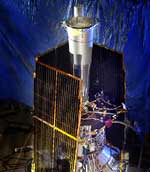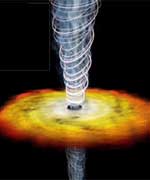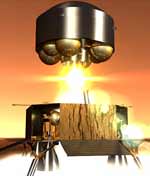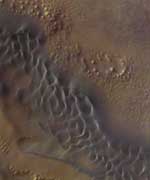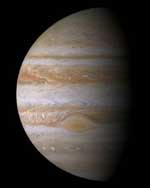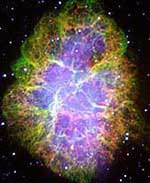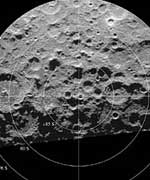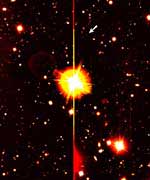
Image credit: ESO
Gamma-ray bursts are some of the largest explosions in the Universe; one can generate more energy in a few seconds than the Sun creates in 10 billion years. It’s believed they’re caused when a super-massive star collapses, called a hypernova. Astronomers from the European Southern Observatory tracked the afterglow of a recent burst by using a technique called polarimetry, which lets them track the shape of the explosion. If it was a spherical explosion, the light would have random polarity, but they found that gas is flowing out in jets which are widening over time.
“Gamma-ray bursts (GRBs)” are certainly amongst the most dramatic events known in astrophysics. These short flashes of energetic gamma-rays, first detected in the late 1960’s by military satellites, last from less than one second to several minutes.
GRBs have been found to be situated at extremely large (“cosmological”) distances. The energy released in a few seconds during such an event is larger than that of the Sun during its entire lifetime of more than 10,000 million years. The GRBs are indeed the most powerful events since the Big Bang known in the Universe, cf. ESO PR 08/99 and ESO PR 20/00.
During the past years circumstantial evidence has mounted that GRBs signal the collapse of extremely massive stars, the so-called hypernovae. This was finally demonstrated some months ago when astronomers, using the FORS instrument on ESO’s Very Large Telescope (VLT), documented in unprecedented detail the changes in the spectrum of the light source (“the optical afterglow”) of the gamma-ray burst GRB 030329 (cf. ESO PR 16/03). A conclusive and direct link between cosmological gamma-ray bursts and explosions of very massive stars was provided on this occasion.
Gamma-Ray Burst GRB 030329 was discovered on March 29, 2003 by NASA’s High Energy Transient Explorer spacecraft. Follow-up observations with the UVES spectrograph at the 8.2-m VLT KUEYEN telescope at the Paranal Observatory (Chile) showed the burst to have a redshift of 0.1685 [1]. This corresponds to a distance of about 2,650 million light-years, making GRB 030329 the second-nearest long-duration GRB ever detected. The proximity of GRB 030329 resulted in very bright afterglow emission, permitting the most extensive follow-up observations of any afterglow to date.
A team of astronomers [2] led by Jochen Greiner of the Max-Planck-Institut f?r extraterrestrische Physik (Germany) decided to make use of this unique opportunity to study the polarisation properties of the afterglow of GRB 030329 as it developed after the explosion.
Hypernovae, the source of GRBs, are indeed so far away that they can only be seen as unresolved points of light. To probe their spatial structure, astronomers have thus to rely on a trick: polarimetry (see ESO PR 23/03).
Polarimetry works as follows: light is composed of electromagnetic waves which oscillate in certain directions (planes). Reflection or scattering of light favours certain orientations of the electric and magnetic fields over others. This is why polarising sunglasses can filter out the glint of sunlight reflecting off a pond.
The radiation in a gamma-ray burst is generated in an ordered magnetic field, as so-called synchrotron radiation [3]. If the hypernova is spherically symmetric, all orientations of the electromagnetic waves will be present equally and will average out, so there will be no net polarisation. If, however, the gas is not ejected symmetrically, but into a jet, a slight net polarisation will be imprinted on the light. This net polarisation will change with time since the opening angle of the jet widens with time, and we see a different fraction of the emission cone.
Studying the polarisation properties of the afterglow of a gamma-ray burst thus allows to gain knowledge about the underlying spatial structures and the strength and orientation of the magnetic field in the region where the radiation is generated. “And doing this over a long period of time, as the afterglow fades and evolves, provides us with a unique diagnostic tool for gamma-ray burst studies”, says Jochen Greiner.
Although previous single measurements of the polarisation of GRB’s optical afterglow exist, no detailed study has ever been done of the evolution of polarisation with time. This is indeed a very demanding task, only possible with an extremely stable instrument on the largest telescope… and a sufficient bright optical afterglow.
As soon as GRB 030329 was detected, the team of astronomers therefore turned to the powerful multi-mode FORS1 instrument on the VLT ANTU telescope. They obtained 31 polarimetric observations over a period of 38 days, enabling them to measure, for the first time, the changes of the polarisation of an optical gamma-ray burst afterglow with time. This unique set of observational data documents the physical changes in the remote object in unsurpassed detail.
Their data show the presence of polarisation at the level of 0.3 to 2.5 % throughout the 38-day period with significant variability in strength and orientation on timescales down to hours. This particular behaviour has not been predicted by any of the major theories.
Unfortunately, the very complex light curve of this GRB afterglow, in itself not understood, prevents a straightforward application of existing polarisation models. “It turns out that deriving the direction of the jet and the magnetic field structure is not as simple as we thought originally”, notes Olaf Reimer, another member of the team. “But the rapid changes of the polarisation properties, even during smooth phases of the afterglow light curve, provide a challenge to afterglow theory”.
“Possibly”, adds Jochen Greiner, “the overall low level of polarisation indicates that the strength of the magnetic field in the parallel and perpendicular directions do not differ by more than 10%, thus suggesting a field strongly coupled with the moving material. This is different from the large-scale field which is left-over from the exploding star and which is thought to produce the high-level of polarisation in the gamma-rays.”
Original Source: ESO News Release
